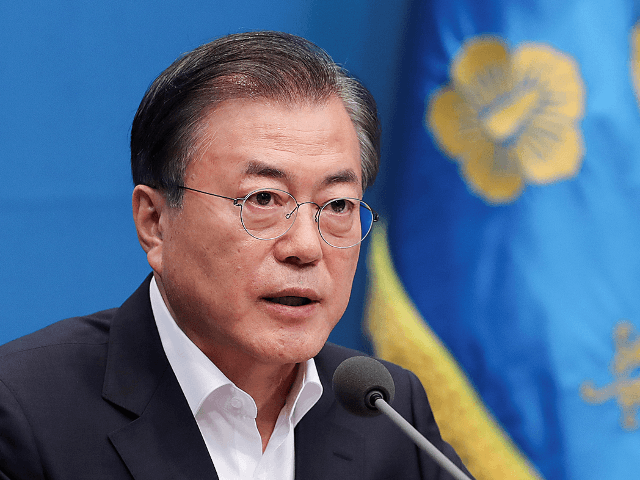Leftist South Korean President Moon Jae-in hit a record low job approval rating in a poll published Monday by the South Korean firm Realmeter.
Only 36.7 percent of respondents nationwide said they approved of Moon’s performance as president. Moon received his second-lowest ratings in a Realmeter poll a week ago, where 37.4 percent approved.
Moon is facing a resurgence in Chinese coronavirus cases nationwide after receiving significant positive press in the first half of 2020 for allegedly containing the domestic outbreak. As a result, Moon has imposed increasingly strict restrictions on Koreans’ movements and implemented surveillance techniques to contact-trace that have met opposition. Most prominently, some contact tracing measures endangered members of Seoul’s LGBT community by potentially outing individuals who were not openly gay in their workplaces or with their families.
Moon, a Catholic, also outraged Korean Christians by banning Christmas church services this year to prevent the virus from spreading.
Moon’s tenure has been marked by a lenient policy towards North Korea, which is still technically at war with Seoul despite active hostilities in the Korean War ending in 1953, which has also contributed to resistance against his administration. On Monday, the Moon administration approved a law that bans South Koreans from sending leaflets with information on the outside world into North Korea, a common practice for activists and those who wish to communicate with families on the other side. Opponents have accused Moon of violating the right of free expression of his own citizens to appease the communist regime in Pyongyang.
Yonhap noted that the past two weeks of Realmeter polls have shown Moon’s approval below 40 percent, trending increasingly downward. Last week’s poll was the first to show his approval below 40 percent. In contrast, approval of his left-wing Democratic Party increased by one percentage point, though still lower than Moon’s personal approval rating at 30.8 percent.
Yonhap noted that Moon had dropped in support in key demographics, such as Koreans between ages 20-29 and residents of Seoul, the capital and largest city in the country. Moon lost the most support in a week with twentysomethings but also experienced an over four-percent drop in approval with respondents who identified as “liberal.”
Reuters noted last week, in reporting on Moon hitting record-low approval at the time, that another poll by Gallup Korea showed his approval rating at a similar level at 39 percent. The Gallup rating was similar to his rating in 2017, when he became president, Reuters reported.
“Realmeter highlighted the resurgence of COVID-19 [Chinese coronavirus] and the government’s seemingly lax vaccination plan compared to other countries as one of the biggest reasons for the continued downward trend in Moon’s support,” the Korea Times reported, warning that he may lose reelection if the trend continues.
South Korea documented 880 coronavirus cases on Tuesday, most of them cases of individuals contracting the virus domestically. The nation’s largest single-day total positive tests — 1,030 cases — occurred on Sunday. South Korea has documented 44,364 cases in total since the pandemic began late last year. Of these cases, 600 have been fatal.
Moon attracted global praise in March and April for rapidly locking down communities and using contract tracing to find potential coronavirus cases. South Korea’s first cases were traced to members of the Shincheonji Church, a sect that worships founder Lee Man-hee as a living manifestation of Jesus Christ. As the church kept membership logs, South Korean authorities had an easier time tracing contacts of coronavirus cases initially than other countries that had less information regarding the first patients to carry the virus.
Rumors initially flew that members had traveled to Wuhan, China, where the pandemic originated, to purposely help the virus spread and bring about the apocalypse, which members denied. Several church members committed suicide as a result of social pressure and scorn regarding the pandemic.
Despite the impact on Shincheonji members — and a general increase in self-harm and suicide attempts nationwide during the initial coronavirus lockdown — Moon made headlines after his government held a national, in-person election in April, which his Democratic Party won handily. At the time, positive tests fell to below 50 a day nationwide, which some used to argue in favor of Moon’s approach to containing the pandemic.
The situation remained stable for much of the summer before cases began to rise once again in the fall, resulting in the re-implementation of coronavirus social distancing measures. Currently, South Koreans cannot gather in groups of more than 50 people and restaurants cannot welcome customers, aside from takeout orders, after 9 p.m. The limitations on public gatherings have resulted in the cancelation of church services during Christmas, which has caused outrage and dismay among Christians.
“(The government) should suggest a tightly targeted model that does not infringe on the freedom of religion and daily lives of the people,” the United Christian Churches of Korea, which represents several major churches in the country, said in a statement this month that called current measures “unrealistic.” “We should prepare for the post-pandemic, recognizing the importance of not just sanitary, physical disinfection but also psychological, mental disinfection.”
Moon’s administration has attempted to lift citizens’ morale with a drone light display in Seoul in November that commanded viewers, “Cheer up, Republic of Korea!” The drone light show also promoted Moon’s costly “Korean New Deal” program, which would invest billions in government programs to help the underprivileged.

COMMENTS
Please let us know if you're having issues with commenting.